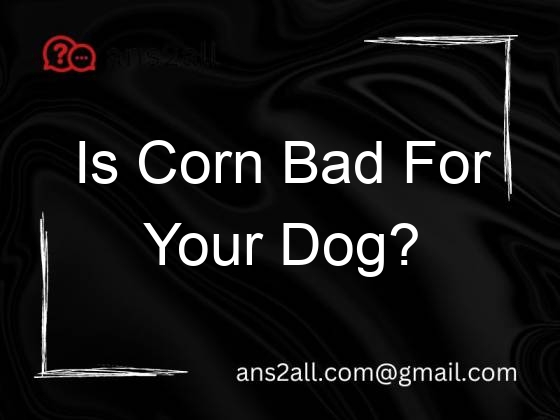Is Corn Bad For Your Dog?
Corn is a grain used for a variety of products. The kernel contains a natural toxin called lectin, which can block the absorption of nutrients from other foods. This, combined with its high calorie and low fiber content, can lead to health problems such as heart disease, obesity, and cancer.
Corn is actually a good food when consumed in moderation. The best way to consume corn is in minimally-processed forms (without corn syrup). Corn is rich in fiber and antioxidants, which are important for healthy skin, bones, and eyes. However, eating excessive amounts of corn can increase your blood sugar levels and contribute to weight gain. In reasonable amounts, corn is a versatile and affordable food source.
Corn syrup is derived from corn starch, and contains high amounts of fructose and glucose. High levels of corn syrup can be harmful to your health. Fructose is more damaging to your system than glucose. HFCS is the most common sugar added to processed foods. High levels of corn can cause symptoms such as bloating, diarrhea, and gas.
Corn is a great source of fiber and nutrients for your dog. It is also easily digestible and can be a good source of energy for your dog. Fresh corn kernels, however, contain insoluble fiber that can lead to incomplete digestion. Whether your dog eats corn on the cob or sweet corn kernels, remember that corn has several health risks.
High-fructose corn syrup has been linked to diabetes, obesity, and insulin resistance. While these aren’t the most obvious reasons to eat less corn, it’s important to realize that it does have some health benefits. Corn contains vitamin C and B vitamins, as well as magnesium. Vitamin C is essential for cell repair, and B vitamins help energy metabolism. Lastly, magnesium has many important functions for your body, including nerve conduction and muscle contraction.
Corn is fine for cats to eat when cooked plain, but you should limit its intake to avoid causing a stomach upset. However, corn doesn’t provide your cat with much nutrition. It is a good source of fiber and protein, but too much can make your cat bloated and uncomfortable. While corn is a good source of energy, you shouldn’t feed your cat corn that contains a high percentage of sugar and salt.
Corn contains 40% carbohydrates, 20% protein, and 30% fat. It is an excellent source of fiber, magnesium, phosphorus, and potassium. It is also a good source of fiber, zinc, and copper. Corn is used in a variety of food products, including snacks, cereal, and desserts. It is also used as livestock feed.
Corn is also hard on the teeth of dogs. It can be dangerous for dogs because corn kernels can get stuck in their teeth. This can lead to serious intestinal blockage. If your dog has eaten corn, make sure to consult your veterinarian right away.




